Ready to dive into a city where the past and present dance in harmony? Welcome to Jeonju, South Korea’s hidden gem! Nestled in the heart of the Jeolla Province. This city is a vibrant tapestry of traditional Hanok houses, cutting-edge art galleries, and culinary delights that will have you coming back for seconds (or thirds!).
Jeonju isn’t just a destination; it’s an experience, offering a deep dive into Korea’s rich heritage, bustling modern life, and, let’s not forget, the birthplace of bibimbap. Whether you’re strolling through the Jeonju Hanok Village, catching a film at the Jeonju International Film Festival, or savoring street food that bursts with flavor, Jeonju promises a journey that’s as flavorful as it is unforgettable. Let’s unpack what makes Jeonju a must-visit for anyone seeking the soul of Korea.
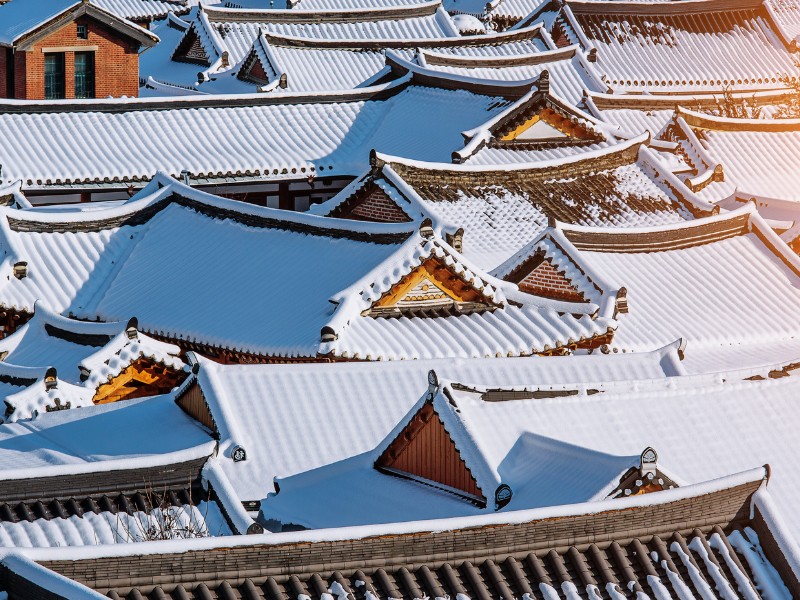
A Step Back in Time: Jeonju Hanok Village
Tradition Lives Here: With over 800 traditional Korean houses, the Jeonju Hanok Village is where history breathes and thrives. Wander the cobblestone streets, sip on traditional teas, and maybe even spend the night in a Hanok to fully immerse yourself in Korea’s architectural beauty.
Culinary Capital: The Flavors of Jeonju
A Foodie’s Paradise: Dubbed Korea’s culinary capital, Jeonju takes your taste buds on an adventure with its traditional dishes and street food. From the famous Jeonju bibimbap to savory bean sprout soup and mouth-watering street snacks, every meal is a celebration of Jeolla Province’s rich agricultural heritage.
Art and Soul: Jeonju’s Creative Pulse
Where Art Meets Heart: Jeonju’s vibrant arts scene is on full display in its galleries, street art, and the annual International Film Festival. The city’s commitment to preserving traditional crafts, such as Hanji (Korean paper) making, adds another layer to its cultural tapestry.
Green Escapes: Nature in the City
Urban Oasis: Amidst its bustling streets, Jeonju offers serene escapes like the Jeonju Zoo and Deokjin Park. The latter, with its lotus pond that blooms vibrantly in summer, provides a peaceful counterpoint to the city’s lively atmosphere.
So, grab your camera, bring your appetite, and let Jeonju take you on a journey through the heart of Korea.
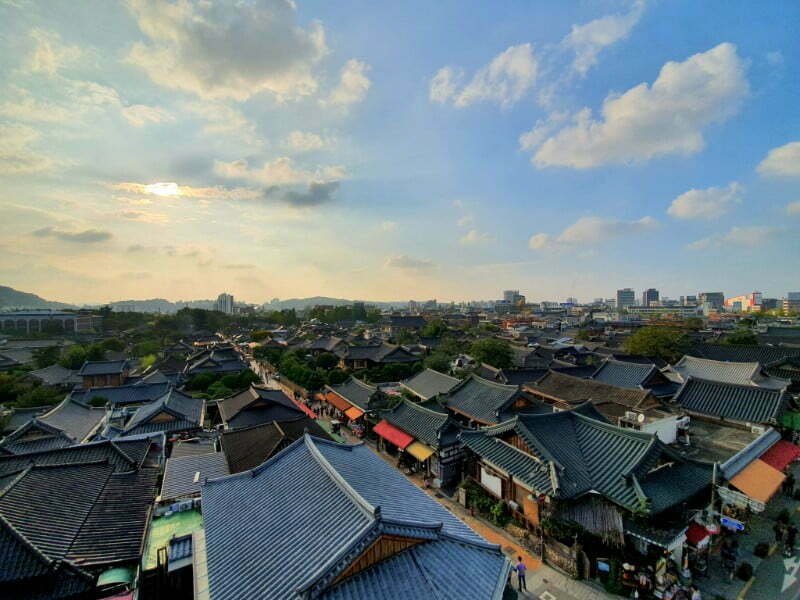
Jeonju City Guide: A Brief History Of Jeonju, South Korea
Ready to time travel? Strap in because Jeonju, nestled in the heart of South Korea, is not just a city; it’s a living museum where every alley, building, and dish tells a tale. From its roots as a royal city to its evolution into a cultural powerhouse, Jeonju’s history is as rich and flavorful as its famed cuisine. Let’s peel back the layers of time and explore the historical journey that has shaped Jeonju into the vibrant city it is today.
The Birth of a Dynasty
A Royal Legacy: Jeonju holds a special place in Korean history as the birthplace of the Joseon Dynasty, one of Korea’s most renowned and influential dynasties. The city was home to the esteemed Yi family, from which the dynasty’s founder, King Taejo, hailed. This royal connection imbued Jeonju with a sense of prestige and cultural significance that still resonates through its streets today.
A Cultural Heartbeat
Preserving Tradition: Throughout the centuries, Jeonju has been a custodian of Korean culture, fiercely protecting and nurturing traditional arts, cuisine, and architecture. The city’s Hanok Village, with its beautifully preserved traditional houses, is a testament to Jeonju’s dedication to keeping history alive. It’s a place where the past isn’t just remembered; it’s experienced.
The Culinary Capital
A Feast Through Time: Jeonju’s reputation as Korea’s culinary capital isn’t new. For centuries, its fertile lands have provided a bounty of ingredients that local chefs have skillfully transformed into dishes fit for royalty. The invention of bibimbap, one of Korea’s most beloved dishes, is proudly claimed by Jeonju, showcasing the city’s enduring influence on Korean cuisine.
Modern Innovations
Blending Old and New: While deeply rooted in tradition, Jeonju has never shied away from innovation. The city has embraced modernity, integrating contemporary arts, technology, and sustainability initiatives with its historical heritage. This fusion makes Jeonju a unique destination where the past and future coexist harmoniously.
Jeonju Today
A Living History: Today, Jeonju stands as a beacon of cultural pride, drawing visitors from around the world eager to experience its rich history, vibrant arts scene, and unparalleled cuisine. The city serves as a reminder of the importance of preserving cultural identity while embracing progress and change.
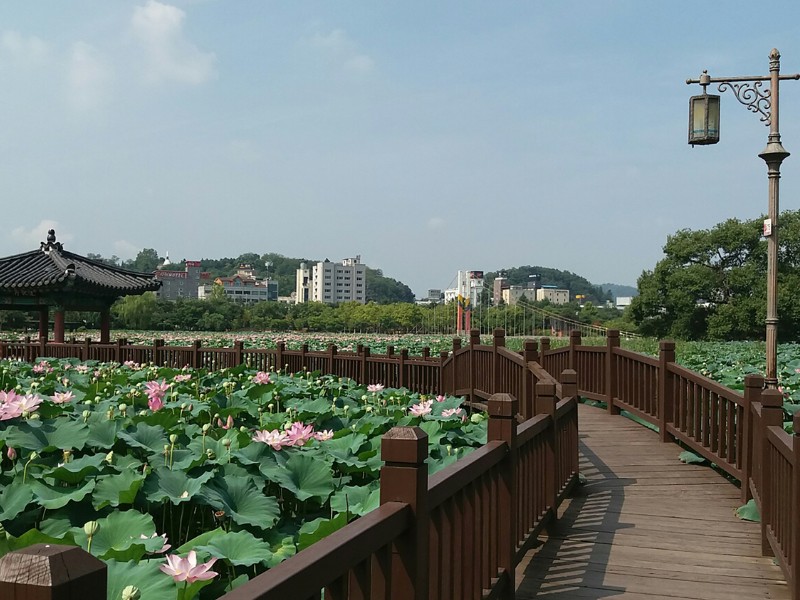
Jeonju Top Attractions and Best Places to Visit in Korea
Korea may be a small country, but Jeonju is a bit out of the way. It takes 2-3 hours by bus, and the fastest train will get you here in one hour 40 minutes. If you persevere, though, you’ll find a city bursting with culture.
Start with its traditional folk village within city limits, then move on to its museums. Stop for a meal of local bibimbap, then explore its Christian heritage. During your time in Jeonju, you won’t be short of things to do.
Start your time in North Jeolla’s largest city by checking out the Jeonju Hanok Village. In actuality, this isn’t a ‘village’, per se – it is a neighbourhood of traditional houses. They stand in stark contrast to the towers that popped up like mushrooms over the past generation.
With over 800 houses, there is no shortage of buildings to explore and photograph. With signature roofs, separate rooms for men and women, and heated floors, you’ll be fascinated how different the lives of Koreans used to be.
Do you want to check out a historical point of interest in the Jeonju area? Make room in your schedule for the Gyeonggijeon Shrine. It holds the portrait of King Taejo, and mortuary tablets for him and his wife.
More Attractions
Around since the 15th century, it has seen many wars since its founding. A battle fought during The Imjin War led to the partial destruction of this structure. Since then, it has been renovated periodically to keep it in its original form. In addition to the relics mentioned above, carriages used to transport dignitaries are also on display.
Keep exploring the legacy of Korea’s monarchy by including the Royal Portrait Museum in your sightseeing. Only open since 2010, it is a recent addition to Jeonju. Here, you’ll find the painted likeness of numerous Korean monarchs, including King Sejong, King Yeongjo, and King Cheoljong.
Additional exhibits relay royal history and show off artifacts that include incense burners and objects related to rituals. Allow at least an hour and a half to fully appreciate everything this museum has to offer.
While in the Jeonju area, make time to check out two historically significant places, Omokdae and Imokdae. Located atop a steep hill, Omokdae is where Yi Seong-gye (later King Taejo) celebrated his victory over the Japanese. Imokdae is a short distance away at the base of Seungamsan Mountain. It was here where King Taejo’s great-great-great-grandfather Mokjo engaged in war games with his friends.
Mokjo was banished from Jeonju by rivals – five generations later, King Taejo believed the gods preordained his rise to power. This accomplishment and Taejo’s victory over the Japanese are honoured with an attractive pavilion. The views from here are spectacular, especially in the fall, so don’t forget your camera at your accommodation.
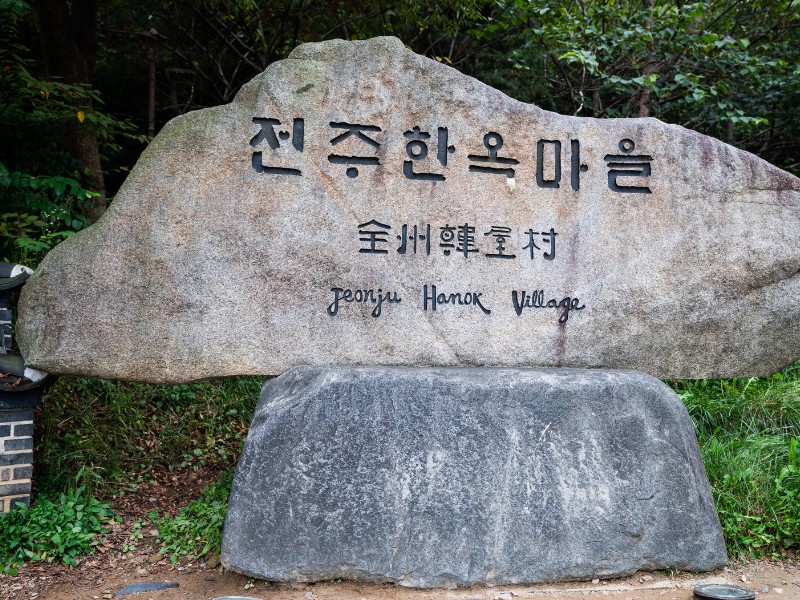
Other Cultural Attractions: Trip to Jeonju, South Korea
The Jeonju area has long been a stronghold for Christianity in Korea. As such, it should come as no surprise to find a church as attractive as the Jeondong Catholic Cathedral. Religious authorities built this 100-year-old cathedral in honour of missionaries who martyred themselves during the Joseon Dynasty.
Built in the Romanesque style, this church greatly resembles Seoul’s Myeongdong Cathedral. There’s a reason for this – Father Poinel, its priest, took it upon himself to design the church in Jeonju. One final note – its bricks were sourced from the Jeonjueupseong Fortress after the Japanese dismantled it.
Get in touch with local street life by visiting the Nambu Traditional Market. Founded in 1905, it boasts a mix of produce, housewares, and other goods. Entrepreneurs from the current generation have rejuvenated its stalls, offering goods commonly found in Seoul’s Hongdae. Food fans will want to drop by Friday or Saturday evening, as additional stalls offer treats from nokdujeon to bibimbap.
Other Attractions
Are you looking for an attraction that pairs The Office with Jeonju? Set aside enough space in your schedule for a visit to the Hanji Museum. This institution exists to extol the virtues of Korean-made paper, or Hanji. During your time here, you’ll get to feel 100 different kinds of Hanji and see the machinery that creates it. On top of this, you’ll get to make sheets of Hanji – exciting!
Take a second to chill out and relax during your visit to Jeonju by stopping by Deokjin Park. Situated around a pond that has been relevant since the Goryeo Dynasty, it is a favourite among locals. Famous for its water irises and lotus blossoms, it is the place to be on a beautiful day.
Park officials hold fountain shows regularly between April and October, and pedal boats are available for rent. Buy some food from a local supermarket or shop and enjoy an afternoon here – you’ll love it!
source: She travel the world on YouTube
Top 20 Things To Do in Jeonju, Korea For Visitors
Here are the top 20 things to do in Jeonju:
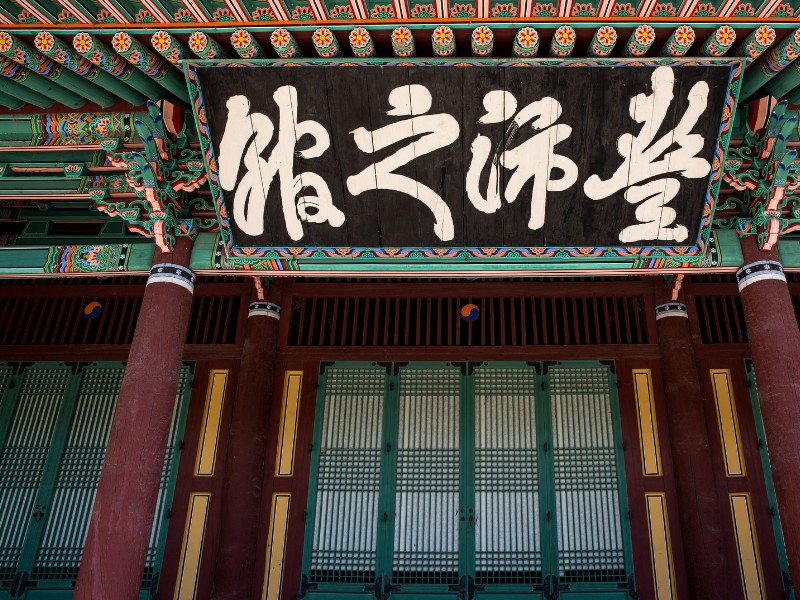
1. Explore Jeonju Hanok Village
Jeonju Hanok Village boasts over 800 traditional Korean houses, known as hanoks, where you can immerse yourself in the beauty of Korean architecture. Strolling through the village, you’ll find traditional tea houses, artisan shops, and cultural museums. Many hanoks operate as guesthouses, offering a unique overnight stay. The village also hosts various cultural events and traditional performances throughout the year.
- Historic charm: Experience Korea’s architectural heritage firsthand.
- Cultural immersion: Participate in workshops and traditional activities.
- Unique lodging: Stay overnight in an authentic hanok guesthouse.
2. Taste Authentic Jeonju Bibimbap
Jeonju is famous for bibimbap, a delicious Korean dish consisting of rice, mixed vegetables, beef, egg, and spicy gochujang sauce. Numerous restaurants throughout the city serve their version of this iconic dish, each adding a unique twist. Trying bibimbap in Jeonju is a must-do for food lovers. Don’t forget to explore other local delicacies like kongnamul gukbap (bean sprout soup) and choco pies.
- Culinary delight: Savor the original taste of Jeonju bibimbap.
- Food variety: Explore a range of local dishes and snacks.
- Authentic experience: Dine where the dish was first created.
3. Visit Jeonjuhyanggyo Confucian School
The Jeonjuhyanggyo Confucian School is a historical site that offers insights into Korea’s educational system during the Joseon Dynasty. The school features well-preserved classrooms and lecture halls where Confucian teachings were imparted. It’s a peaceful place for reflection, surrounded by ancient trees. The site often hosts traditional Korean music performances and cultural events.
- Historical education: Learn about Confucianism’s impact on Korea.
- Serene environment: Enjoy the tranquility amid centuries-old trees.
- Cultural events: Attend performances that bring history to life.
4. Enjoy the View from Omokdae Pavilion
Omokdae Pavilion is perched on a hilltop, offering stunning panoramic views of Jeonju Hanok Village and the city beyond. The pavilion is a historic site where King Taejo celebrated a victory with his generals. It’s an ideal spot for photography, especially during sunset. Visitors can enjoy a leisurely hike up to the pavilion, passing through scenic areas of the Hanok Village.
- Breathtaking vistas: Capture memorable photos of the cityscape.
- Historical significance: Stand where royalty once celebrated.
- Scenic hike: Enjoy a pleasant walk with rewarding views.
5. Experience Traditional Korean Crafts at Jeonju Traditional Culture Center
The Jeonju Traditional Culture Center offers workshops where you can learn about and participate in making traditional Korean crafts such as hanji (Korean paper), pottery, and calligraphy. The center also provides hanbok (traditional Korean attire) rental services, allowing you to dress up and take beautiful photos around the Hanok Village. It’s a great way to immerse yourself in Korean culture.
- Hands-on workshops: Create your own traditional crafts.
- Cultural attire: Dress in hanbok for an authentic experience.
- Interactive learning: Engage with Korea’s rich artistic traditions.
6. Sample Local Street Food at Nambu Market
Nambu Market, established in the early 20th century, is a bustling marketplace that comes alive at night with its famous night market. Sample a wide array of street food, from Korean pancakes (jeon) and skewered meats to inventive modern snacks. The market also houses vendors selling clothing, accessories, and household goods. It’s a lively spot to experience the local food scene and shop for unique souvenirs.
- Foodie’s paradise: Taste a variety of delicious street foods.
- Vibrant atmosphere: Enjoy the bustling energy of a traditional market.
- Shopping: Find unique items and keepsakes to take home.
7. Relax at Deokjin Park
Deokjin Park is known for its beautiful lotus pond, which blooms vibrantly in summer. The park features walking paths, traditional pavilions, and a fountain show. It’s a popular spot for families, couples, and anyone looking to enjoy nature within the city. Pedal boats are available for rent, offering a fun way to explore the pond.
- Natural beauty: Stroll among blooming lotuses and serene waters.
- Recreational activities: Rent a pedal boat for some fun on the pond.
- Relaxation: Unwind in a peaceful urban oasis.
8. Learn at the Jeonju National Museum
The Jeonju National Museum houses a rich collection of artifacts and exhibits related to the history and culture of the Jeolla region. Highlights include traditional Korean ceramics, calligraphy, and folk art. The museum’s architecture is itself a blend of traditional and modern styles. Special exhibitions and educational programs are held throughout the year.
- Cultural treasures: Explore artifacts spanning Korea’s history.
- Educational programs: Participate in workshops and lectures.
- Architectural beauty: Admire the museum’s unique design.
9. Visit Gyeonggijeon Shrine
Gyeonggijeon Shrine was erected in 1410 to house the portrait of King Taejo, the founder of the Joseon Dynasty. The shrine complex includes historical buildings, a museum, and a serene garden. It’s a place of cultural and historical significance, offering a glimpse into the royal lineage of Korea. The shrine also serves as a picturesque backdrop for photos, especially in traditional Korean attire.
- Historical site: Delve into the legacy of the Joseon Dynasty.
- Beautiful gardens: Enjoy a peaceful walk among well-kept grounds.
- Photo opportunities: Capture moments in a majestic setting.
10. Walk Along Jeonju Cheongyeon River
The Jeonju Cheongyeon River, running through the city, offers beautiful walking paths lined with trees and sculptures. It’s a lovely area for a leisurely stroll, particularly in the evening when the bridges and walkways are illuminated. The river walk connects several of Jeonju’s attractions, making it a pleasant way to navigate the city. Along the way, you’ll find cafes and perfect spots for a restful break.
- Scenic strolls: Enjoy picturesque views along the river.
- Evening lights: Experience the enchanting nighttime illuminations.
- Convenient path: Access multiple attractions with ease.
11. Take a Hanbok Photography Tour
Wearing hanbok and taking a photography tour around Jeonju Hanok Village is a popular activity among visitors. Several rental shops offer a wide range of hanboks, from traditional to contemporary designs. It’s a unique experience that allows you to step back in time and create memorable photographs. Many shops offer photography services, or you can explore and take selfies at your own pace.
- Cultural immersion: Dress up in traditional Korean attire.
- Memorable photos: Capture stunning images in authentic settings.
- Personalized experience: Choose from various hanbok styles.
12. Enjoy Jeonju’s Nightlife at Gaeksa
Gaeksa is considered the commercial and nightlife hub of Jeonju, featuring a wide array of bars, clubs, and restaurants. It’s a great place to experience the city’s modern side, enjoy live music, and socialize with locals and other travelers. The area stays lively into the early hours, offering everything from traditional Korean pubs (pojangmacha) to trendy cafes. Gaeksa’s vibrant atmosphere is a contrast to the traditional charm of the Hanok Village.
- Lively entertainment: Experience Jeonju’s bustling nightlife.
- Diverse venues: Choose from bars, clubs, and eateries.
- Social hub: Meet new people and enjoy local hospitality.
13. Discover the Jeonju Korean Traditional Wine Museum
The Jeonju Korean Traditional Wine Museum is dedicated to Korea’s rich history of traditional brewing and winemaking. Learn about the processes involved in making various Korean wines and liquors, including makgeolli and soju. The museum offers tasting sessions and workshops where you can try your hand at brewing. It’s an insightful experience that combines education with pleasure.
- Cultural insight: Understand traditional Korean brewing methods.
- Tasting sessions: Sample a variety of local wines and spirits.
- Interactive workshops: Participate in brewing your own concoction.
14. Visit the Jeonju Zoo
The Jeonju Zoo, located in Jeonju World Cup Stadium Park, offers a family-friendly outing with a variety of animals from around the world. In addition to animal exhibits, the zoo features recreational facilities, including a children’s playground and picnic areas. The zoo is committed to conservation and education, providing a fun and informative experience for visitors. Seasonal events and animal feeding shows add to the zoo’s attractions.
- Family fun: Enjoy a day out suitable for all ages.
- Educational exhibits: Learn about wildlife conservation efforts.
- Interactive experiences: Participate in animal feedings and shows.
15. Explore Jaman Mural Village
Jaman Mural Village is nestled on the hillside near Jeonju Hanok Village and is known for its vibrant street art and murals. The colorful artworks cover the walls of narrow alleys, turning the village into an open-air gallery. It’s a popular spot for photography and exploring local cafes and shops. The village’s artistic atmosphere and stunning views of Jeonju make it a must-visit.
- Artistic exploration: Wander through lanes adorned with murals.
- Café culture: Relax in quaint cafes with unique themes.
- Scenic views: Enjoy panoramic sights of the city from the hillside.
16. Take in the Views from Jeonju World Cup Stadium
The Jeonju World Cup Stadium, known for its unique design resembling a traditional Korean kite, offers tours that include access to the stadium’s facilities and panoramic views of the city from its upper levels. It was one of the venues for the 2002 FIFA World Cup. The stadium complex includes leisure facilities and a park, making it a great place for sports enthusiasts and families.
- Architectural marvel: Admire the stadium’s kite-inspired design.
- Historical significance: Visit a landmark from the 2002 FIFA World Cup.
- Family activities: Enjoy the park and leisure facilities on-site.
17. Enjoy the Arts at Sori Arts Center of Jeolla
The Sori Arts Center of Jeolla is a premier venue for performing arts, hosting a variety of shows ranging from traditional Korean music and dance to modern theatre and concerts. The center’s architecture is modern and impressive, adding to the cultural experience. Enjoy high-quality performances and gain insight into Korea’s vibrant arts scene. The center also hosts international arts festivals and workshops.
- Cultural performances: Experience traditional and contemporary shows.
- Modern venue: Appreciate the center’s stunning architectural design.
- Artistic events: Participate in festivals and interactive workshops.
18. Relax at Palbok Art Factory
Palbok Art Factory is a cultural complex set in a converted factory, offering galleries, art studios, and performance spaces. It’s a hub for contemporary art and culture, showcasing the work of local and international artists. The complex includes cafes and casual eateries, making it a perfect place to relax and enjoy the creative atmosphere. Regular art exhibitions, workshops, and live music events contribute to Jeonju’s modern cultural landscape.
- Creative space: Explore innovative artworks and installations.
- Chill spots: Unwind in trendy cafes within the complex.
- Cultural hub: Engage with the local art community through events.
19. Hike in Moak Mountain
Moak Mountain offers scenic hiking trails that lead to Buddhist temples, serene forests, and panoramic viewpoints overlooking Jeonju. It’s a popular spot for outdoor enthusiasts and provides a peaceful escape from the city. The trails are suitable for hikers of all levels, with the Moaksan Provincial Park offering well-maintained paths. Highlights include Gujeolcho Park, known for its beautiful wild chrysanthemums, and the historic Geumsansa Temple.
- Natural retreat: Enjoy fresh air and stunning natural landscapes.
- Cultural sites: Visit temples nestled within the mountain.
- Accessible trails: Choose paths that match your hiking ability.
20. Experience Jeonju’s Tea Culture at Traditional Tea Houses
Jeonju’s traditional tea houses offer a serene environment to experience Korea’s rich tea culture. Taste a variety of Korean teas, including green tea, herbal teas, and fruit teas, accompanied by traditional Korean sweets. Many tea houses are located in Jeonju Hanok Village, providing a traditional setting that enhances the tea experience. It’s a delightful way to unwind and immerse yourself in Korean tradition.
- Tea tasting: Savor diverse flavors of authentic Korean teas.
- Cultural ambiance: Relax in beautifully designed traditional spaces.
- Sweet accompaniments: Enjoy snacks that perfectly complement your tea.
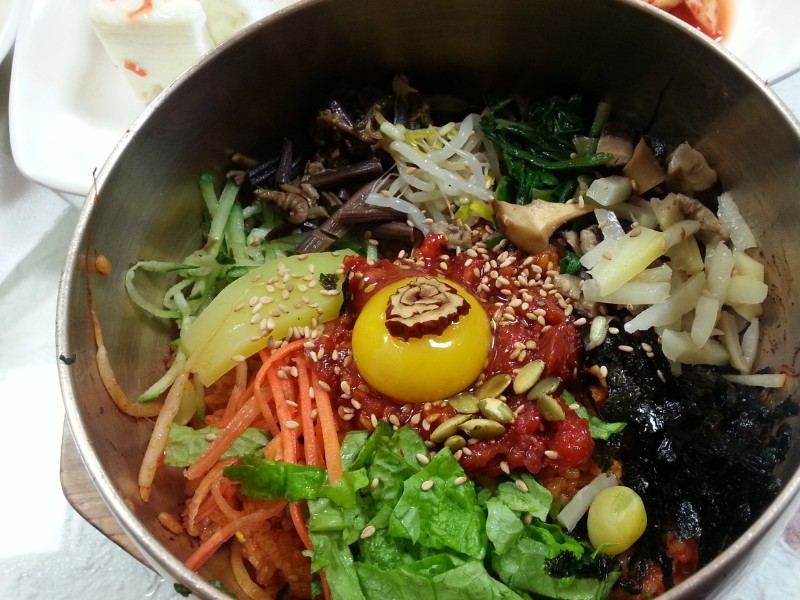
What To Eat and Drink at Restaurants in Jeonju, South Korea
Whether you’re a foodie on the hunt for authentic Korean cuisine or someone looking to taste the heart of Korea, Jeonju has you covered. Let’s dive into the must-eat dishes and must-drink beverages that make Jeonju a gastronomic paradise.
Traditional Delights
1. Jeonju Bibimbap: Starting with the obvious, no visit to Jeonju is complete without trying its world-renowned bibimbap. This dish features a colorful array of vegetables, beef, a fried egg, and gochujang (chili pepper paste) served over rice. It’s not just food; it’s art in a bowl, with each ingredient representing different health benefits.
2. Kongnamul Gukbap: This comforting bean sprout soup with rice is a Jeonju specialty known for its savory, satisfying taste and purported hangover-curing properties. It’s a simple dish with profound flavors, showcasing the city’s love for wholesome, nourishing meals.
Street Food and Snacks
3. PNB Choco Pie: A visit to Jeonju wouldn’t be complete without sampling the original Choco Pie from PNB Bakery. Unlike the mass-produced versions, these treats are freshly made, with fluffy cake and a marshmallow center, all coated in chocolate.
4. Jeonju Hotteok: This sweet, filled pancake is a popular street food snack in Korea, but Jeonju’s version is especially famous. Filled with a mixture of brown sugar, nuts, and cinnamon, it’s a warm, gooey delight that’s perfect for snacking while exploring the Hanok Village.
Unique Sips
5. Moju: This traditional Jeonju beverage is made from makgeolli (rice wine) infused with medicinal herbs and spices. It’s milder and sweeter than regular makgeolli, making it an excellent introduction to Korean traditional alcohol.
6. Jeonju Makgeolli: Speaking of makgeolli, Jeonju’s version of this milky, slightly fizzy rice wine is a must-try. Often served in traditional Korean restaurants alongside a plethora of side dishes, it’s a communal drink that encourages sharing and conversation.
Culinary Experiences
7. Hanjeongsik: For those looking to experience the full spectrum of Korean cuisine, a Jeonju Hanjeongsik is the way to go. This traditional Korean set meal includes a wide array of side dishes, grilled meats, soups, and stews, showcasing the diversity and richness of Korean culinary traditions.
8. Gamaek: A portmanteau of “ga” from “gagae” (store) and “maek” from “maekju” (beer), Gamaek culture involves enjoying cheap beer and snacks at small convenience stores. It’s a unique experience that offers a glimpse into the everyday life of locals.
Sweet Treats
9. Patbingsu: For dessert, don’t miss out on patbingsu, a shaved ice dessert that’s particularly refreshing during the hot summer months. Jeonju’s version often includes a generous topping of sweet red bean paste, mochi, and condensed milk.
10. Yakgwa: This traditional Korean sweet, made from honey, sesame oil, and wheat flour, is deep-fried to perfection. It’s a sticky, sweet confection that’s often enjoyed with tea.
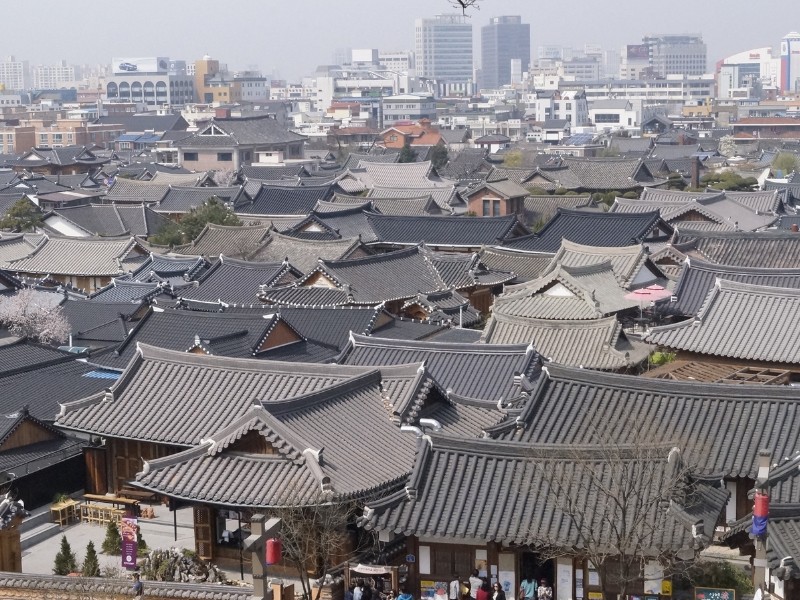
Tours For Visitors To Jeonju, South Korea
Here’s a curated list of tours for visitors to Jeonju, ensuring you get the most out of this vibrant city.
1. Jeonju Hanok Village Walking Tour
Delve into the heart of Korean tradition with a guided walking tour of the Jeonju Hanok Village. Learn about the architectural significance of over 800 traditional Korean houses and discover hidden gems, including artisan shops, traditional tea houses, and beautiful courtyards.
2. Korean Food Cooking Class
Immerse yourself in Korea’s renowned culinary culture with a cooking class right in Jeonju, the birthplace of bibimbap. Local chefs teach you how to prepare traditional Korean dishes, offering insights into the ingredients and techniques that make Korean cuisine uniquely delicious.
3. Jeonju Cultural Heritage Tour
Explore Jeonju’s rich history with a tour focusing on its cultural heritage sites, including Gyeonggijeon Shrine, Jeondong Catholic Church, and the Jeonju Traditional Wine Museum. This tour offers a deep dive into the city’s storied past and its role in the Joseon Dynasty.
4. Jeonju Craft and Artisans Workshop Tour
Get hands-on with Jeonju’s traditional crafts by participating in workshops led by local artisans. From learning the art of making Hanji (Korean paper) to trying your hand at traditional pottery or Korean calligraphy, this tour connects you with the city’s artistic traditions.
5. Jeonju Night Market and Street Food Tour
Experience the vibrant atmosphere of Jeonju’s night markets on a guided street food tour. Sample local delicacies, from Jeonju bibimbap to street snacks like hotteok (sweet pancakes), while soaking in the lively energy of the city after dark.
6. Jeonju Film Street Tour
For film enthusiasts, a tour of the Jeonju Film Street and the Jeonju Cinema Complex offers insights into the city’s burgeoning film scene and its annual International Film Festival. Discover indie film theaters, learn about Korean cinema, and maybe even catch a screening.
7. Jeonju Traditional Alcohol Tasting Tour
Delve into the world of traditional Korean alcohol with a tasting tour in Jeonju. Visit local breweries to sample makgeolli (rice wine) and other traditional beverages, learning about the fermentation process and the role of alcohol in Korean culture.
8. Jeonju Calligraphy and Painting Experience
Engage with Korea’s artistic side by participating in a traditional calligraphy or painting class. Under the guidance of skilled artists, create your own piece of art to take home as a unique souvenir of your time in Jeonju.
9. Jeonju Eco-Tour: Riverside and Nature Walk
For those seeking tranquility, a guided eco-tour along the Jeonjucheon River offers a chance to connect with nature. Discover local flora and fauna, learn about the city’s efforts in preserving natural habitats, and enjoy the peaceful scenery.
10. Jeonju Virtual Reality (VR) Experience
Step into the future with a tour that combines Jeonju’s historical sites with cutting-edge VR technology. This unique experience allows you to see the city’s landmarks in different historical periods, offering a fascinating glimpse into the past through modern means.
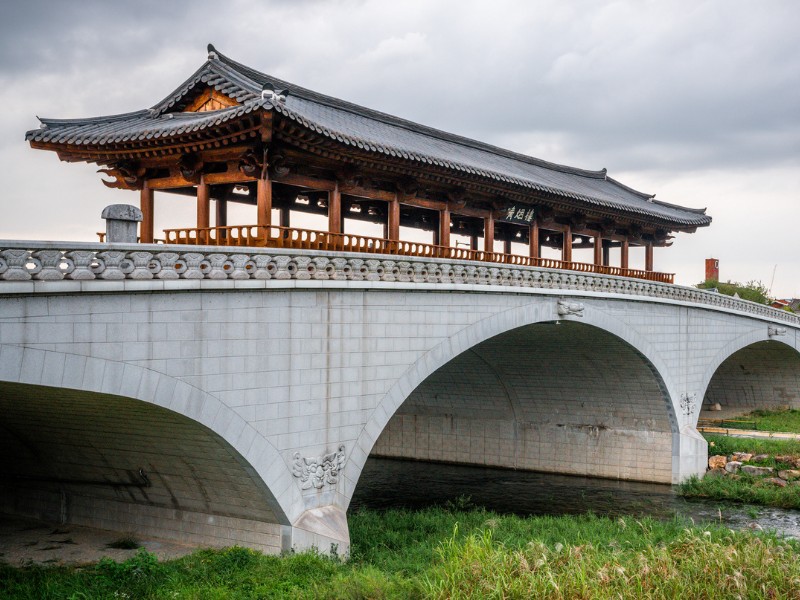
Jeonju Accommodations Guide: Hotels, Guesthouses and Hostels
Here’s a comprehensive travel guide to where to stay in Jeonju, ensuring a comfortable and memorable visit.
Traditional Hanok Stays
1. Rakkojae Jeonju: Experience the elegance of traditional Korean living in this beautifully restored Hanok. Rakkojae offers a serene atmosphere, with rooms that open onto a lovely courtyard, complete with ondol (floor heating), futon beds, and classic wooden architecture.
2. Jeonju Hanok Living Experience Center: Ideal for those looking to immerse themselves in the Hanok lifestyle, this center provides traditional accommodations along with opportunities to learn about Korean culture through various workshops and activities.
3. Jeonju Hanok Hotel: Combining the beauty of traditional Korean architecture with modern conveniences, the Jeonju Hanok Hotel offers a comfortable stay in the heart of the Hanok Village. It’s a perfect blend of old and new, providing an authentic experience without sacrificing comfort.
Modern Hotels
4. Lahan Hotel Jeonju: Located close to the Hanok Village, Lahan Hotel offers contemporary luxury with spacious rooms, an in-house restaurant serving local and international cuisine, and amenities such as a fitness center and sauna.
5. Ramada Jeonju: Situated in downtown Jeonju, the Ramada offers easy access to the city’s attractions. The hotel features modern rooms, a variety of dining options, and meeting facilities, making it suitable for both leisure and business travelers.
Budget-Friendly Hostels and Guesthouses
6. Jeonju Guesthouse Gosadong: For travelers on a budget, Gosadong offers a cozy and friendly atmosphere with both dormitory and private room options. It’s a great place to meet fellow travelers and get insider tips on exploring Jeonju.
7. Pungnam Tourist Hotel: Offering affordable accommodations without compromising on quality, Pungnam Tourist Hotel provides clean and comfortable rooms, conveniently located near the Jeonju Bus Terminal and key attractions.
Boutique and Specialty Accommodations
8. Yihua Hotel Jeonju: This boutique hotel stands out for its unique design, blending traditional Korean elements with contemporary flair. Each room is uniquely decorated, offering guests a stylish and intimate stay experience.
9. Dukmanjae: A traditional Hanok that’s been thoughtfully converted into a boutique guesthouse, Dukmanjae offers an intimate glimpse into Korea’s past, with beautifully preserved rooms and a tranquil courtyard.
Family-Friendly Options
10. Benikea Jeonju Hansung Hotel: Catering to families and larger groups, the Hansung Hotel provides spacious family rooms, along with kid-friendly amenities and easy access to Jeonju’s main attractions, ensuring a comfortable stay for guests of all ages.
Eco-Friendly and Sustainable Stays
11. Jeonju Eco City Hotel: For the environmentally conscious traveler, the Eco City Hotel focuses on sustainable practices without sacrificing comfort. It’s a great choice for those looking to minimize their carbon footprint while enjoying the delights of Jeonju.
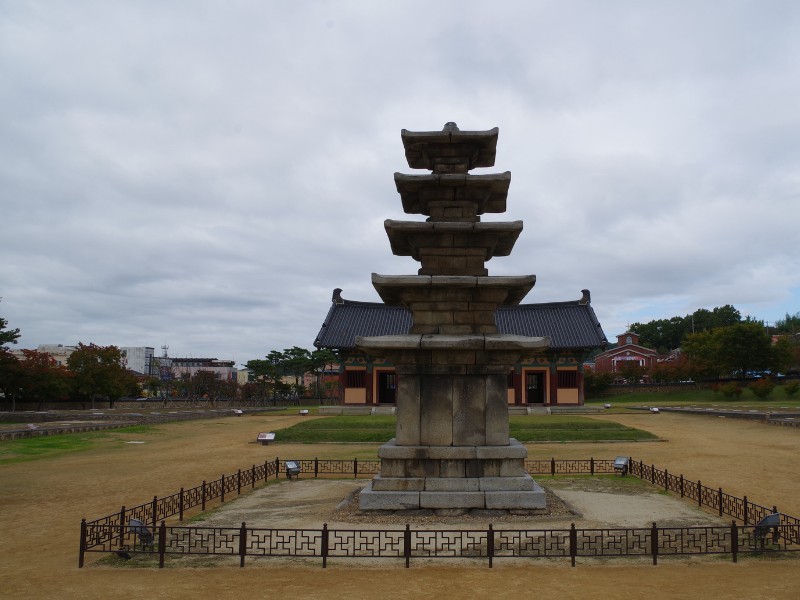
Day Trips From Jeonju, South Korea
Here’s a curated list of day trips from Jeonju, promising diverse experiences that enrich your South Korean journey.
1. Gwanghalluwon Garden and Gwangju
Just a short drive from Jeonju, Gwanghalluwon Garden in Namwon is a picturesque traditional Korean garden, renowned for its beautiful pavilions and bridges. Continue to Gwangju, a city with a rich history of art and democracy, where you can visit the May 18th National Cemetery and the Gwangju National Museum. Gwangju’s bustling food scene, especially around the Yangdong Market, offers a taste of local delicacies. The city is also a hub for contemporary art, with numerous galleries and the Gwangju Biennale exhibition.
2. Maisan Provincial Park
An hour from Jeonju lies Maisan Provincial Park, famous for its unique twin peaks that rise dramatically from the flat surroundings. The park is home to Tapsa Temple, known for its intriguing stone pagodas built by a single monk. Hiking trails offer varying levels of difficulty, providing stunning views of the region. Maisan is especially beautiful during the spring when cherry blossoms and azaleas are in full bloom.
3. Naejangsan National Park
Known for its spectacular autumn colors, Naejangsan National Park is a must-visit for nature lovers, about an hour’s drive from Jeonju. The park features scenic hiking trails, waterfalls, and the historic Naejangsa Temple. The Naejangsan Cable Car offers a less strenuous way to enjoy the park’s panoramic mountain views. Visit in fall to see the mountainside ablaze in vibrant reds and oranges.
4. Daedunsan Provincial Park
Daedunsan is renowned for its dramatic landscapes, featuring rugged peaks and deep valleys. The park’s suspension bridge, Daedunsan Cloud Bridge, offers thrilling views of the surrounding area. A cable car can take you partway up the mountain, making the stunning scenery accessible to all visitors. Daedunsan is another fantastic spot for autumn foliage, making it a popular destination for photographers and hikers alike.
5. Boseong Green Tea Fields
Boseong, a couple of hours from Jeonju, is famous for its vast green tea fields that carpet the rolling hills. Visitors can walk among the tea plantations, learn about the tea-making process, and sample fresh green tea. The area also offers green tea-themed spa treatments for a unique relaxation experience. The annual Boseong Green Tea Festival celebrates the region’s tea culture with various events and activities.
6. Buyeo
A trip to Buyeo immerses you in the history of the Baekje Kingdom, with ruins and artifacts that tell the story of this ancient civilization. The Buyeo National Museum and the Baekje Cultural Land offer insights into the cultural heritage of the region. Visit the Busosanseong Fortress for a glimpse into the military history of the Baekje Kingdom. The nearby Lotus Park is a serene spot, especially beautiful when the lotus flowers bloom in summer.
7. Muju Deogyusan Resort
For those interested in winter sports, Muju Deogyusan Resort offers some of the best skiing and snowboarding in South Korea, about two hours from Jeonju. The resort is located within Deogyusan National Park, offering stunning natural scenery year-round. In the off-season, the area is popular for hiking, with well-marked trails leading through the mountains. The resort also features hot springs, perfect for relaxing after a day on the slopes or trails.
8. Suncheon
Suncheon is known for its ecotourism attractions, including the Suncheon Bay Wetland Reserve, where visitors can observe diverse ecosystems and bird species. The Suncheon Bay National Garden is another must-visit, showcasing beautifully themed gardens from around the world. The nearby Suncheon Open Film Set offers a fun glimpse into Korea’s cinematic history, with sets from various movies and dramas. Suncheon’s culinary scene, especially its seafood, provides a tasty end to the day.
9. Haeinsa Temple
Located in Gayasan National Park, Haeinsa Temple is one of the Three Jewel Temples of Korea and a UNESCO World Heritage site. It houses the Tripitaka Koreana, the most complete collection of Buddhist scriptures engraved on over 80,000 wooden blocks. The temple’s tranquil setting amidst the mountains offers a peaceful retreat. Guided tours are available, providing insights into the temple’s history and significance.
10. Jinan and Tapsa Temple
Jinan is home to Tapsa Temple, unique for its hundreds of stone pagodas built by a single monk, which are nestled within the scenic Maisan Mountain. The surrounding area, with its mystical rock formations and tranquil atmosphere, provides a backdrop for reflection and exploration. Jinan also hosts the annual Red Ginseng Festival, celebrating one of the region’s most famous products. The nearby Jucheongang River offers picturesque walking paths and recreational areas.
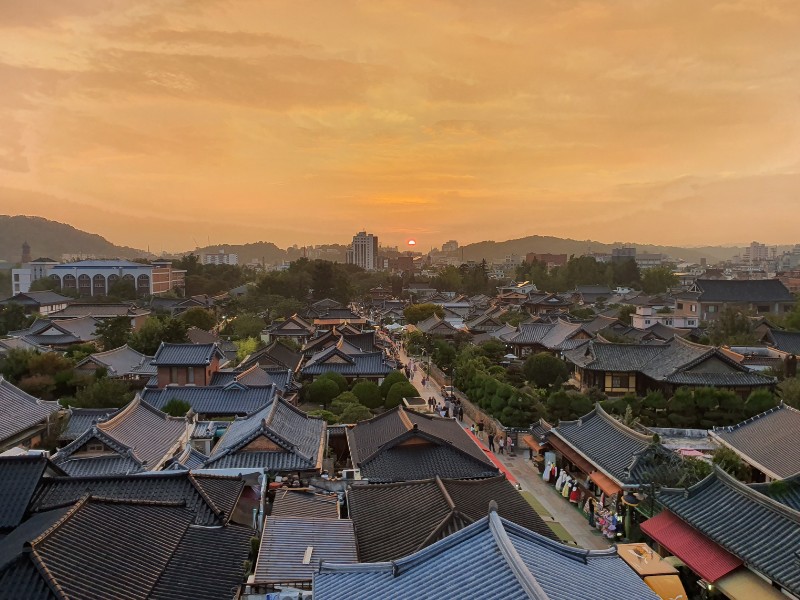
Jeonju Transportation Guide
Here’s a complete travel guide to getting around Jeonju and beyond.
Getting to Jeonju
By Air: The closest major airport to Jeonju is Incheon International Airport, with many travelers opting to fly into Seoul and then travel to Jeonju by bus or train. Another nearby option is the Gunsan Airport, offering domestic flights and located about an hour away from Jeonju.
By Train: Jeonju is well-connected by Korea’s efficient train network. The KTX (Korea Train eXpress) operates between Jeonju and major cities like Seoul, making the journey fast and convenient. The Jeonju Train Station is located just outside the city center, with buses and taxis readily available for onward travel.
By Bus: Intercity buses run frequently to Jeonju from Seoul and other major cities. The Jeonju Intercity Bus Terminal is centrally located and serves as a hub for travelers entering the city. Buses offer a cost-effective option and provide scenic views of the countryside.
Getting Around Jeonju
On Foot: The historic Hanok Village and surrounding areas are best explored on foot. Many of Jeonju’s attractions, including traditional tea houses, artisan shops, and street food vendors, are located within walking distance of each other, making walking both enjoyable and practical.
By Bicycle: Jeonju is a bike-friendly city, with several bicycle rental shops available, especially near tourist areas. Biking is an excellent way to cover more ground within the city and enjoy its parks and riverside paths.
By Taxi: Taxis are an efficient and reasonably priced option for getting around Jeonju, especially for destinations outside the city center or for those traveling in groups. Most taxi drivers do not speak English, so it’s helpful to have your destination written in Korean.
By Bus: The city’s bus system connects major attractions, shopping areas, and residential neighborhoods. Buses are a cost-effective way to navigate Jeonju, though routes can be challenging to decipher for non-Korean speakers. Apps like Naver Maps can be invaluable for planning your bus journey.
Day Trips from Jeonju
Rental Cars: For flexibility on day trips to nearby national parks, temples, and rural areas, renting a car might be your best bet. Several rental agencies operate in Jeonju, offering a range of vehicles to suit different group sizes and preferences.
Organized Tours: For those who prefer not to navigate on their own, several travel agencies in Jeonju offer organized tours to popular destinations like Gwanghalluwon Garden, Maisan Provincial Park, and Naejangsan National Park. These tours often include transport, a guide, and admission fees, making for a hassle-free exploration.
Public Transportation: Utilizing trains and buses for day trips is feasible for several destinations around Jeonju. This option requires some planning, especially regarding timetables and connections, but can be an economical choice for solo travelers and those looking to experience local life.
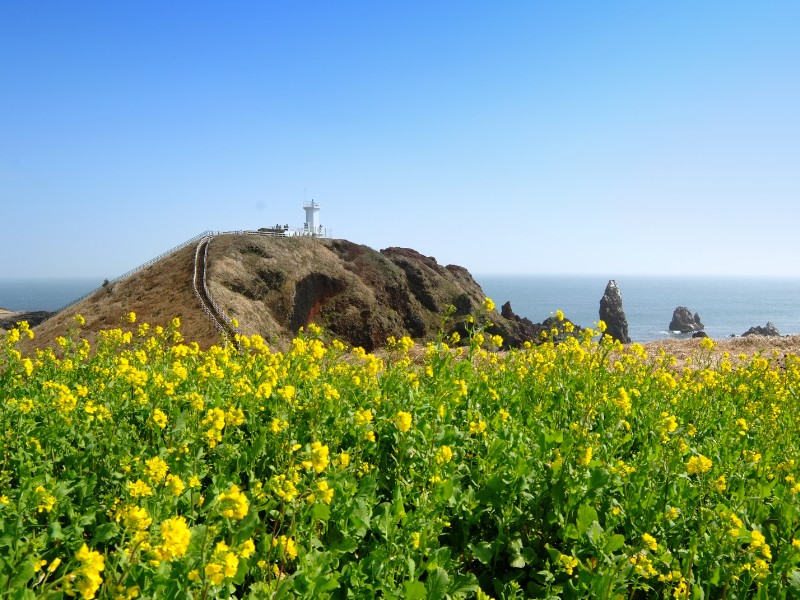
Where To Visit After Your Trip To Jeonju?
Here’s a detailed list of places to visit after Jeonju, offering everything from urban exploration to tranquil retreats.
1. Seoul
The dynamic capital city is a must-visit for its seamless blend of ancient history and cutting-edge modernity. Explore traditional palaces like Gyeongbokgung, dive into the vibrant shopping districts of Myeong-dong and Insadong, and savor street food at Gwangjang Market. The city’s nightlife in areas like Hongdae and Itaewon is legendary. Seoul also serves as a hub for visiting the DMZ, offering a poignant glimpse into the Korean Peninsula’s history.
2. Busan
South Korea’s second-largest city, known for its beautiful beaches, scenic cliffs, and thermal spas. Haeundae Beach offers urban relaxation, while the Beomeosa Temple provides spiritual solace. Don’t miss the Jagalchi Fish Market for a taste of local seafood. For a panoramic view of the city, head to the Busan Tower in Yongdusan Park.
3. Gyeongju
Often referred to as “the museum without walls,” Gyeongju is home to numerous Silla Dynasty relics. Visit Bulguksa Temple and the Seokguram Grotto for a dose of spiritual heritage. The Gyeongju National Museum and the ancient Tumuli Park offer insights into the city’s rich history. For a unique experience, stroll around Anapji Pond at night when the historic ruins are beautifully illuminated.
4. Incheon
Known for its modern airport, Incheon also boasts Chinatown, offering a variety of Chinese-Korean dishes and cultural experiences. The Incheon Grand Park is a serene escape with lovely walking paths. Wolmido Island provides a fun day out with amusement rides and seaside attractions. Explore the Songdo International Business District for its futuristic architecture and urban planning.
5. Jeju Island
A volcanic island offering stunning natural beauty, from the majestic Hallasan Mountain to the serene Cheonjiyeon Waterfall. Jeju’s beaches, like Jungmun and Hyeopjae, are perfect for relaxation or water sports. Explore the mysterious Manjanggul Lava Tubes. The island’s unique culture, seafood cuisine, and local markets make it a fascinating destination year-round.
6. Andong
Famous for its traditional Korean culture, including the Hahoe Folk Village, a UNESCO World Heritage site. Experience traditional mask dances and sample Andong jjimdak, a savory chicken dish. The Andong Folk Museum offers insights into the area’s history and culture. The city is also known for its annual International Mask Dance Festival.
7. Suwon
Just south of Seoul, Suwon is famed for its well-preserved Hwaseong Fortress, a UNESCO World Heritage site. The fortress walls offer a scenic walking path with views of the city. The Korean Folk Village in Suwon provides a comprehensive look at Korea’s traditional lifestyles. Don’t miss the chance to try Suwon galbi, a delicious Korean BBQ variant.
8. Chuncheon
Known as the ‘City of Lakes’, Chuncheon offers a peaceful retreat with beautiful scenery and is famous for dak galbi, spicy stir-fried chicken. Enjoy boat rides on the Soyang River or explore the tranquil Nami Island, known for its tree-lined pathways. The Chuncheon Puppet Festival adds a unique cultural experience. Outdoor enthusiasts will love the numerous water sports available on the lakes.
9. Gangneung
A coastal city that boasts beautiful beaches like Gyeongpo and Anmok. Don’t miss the opportunity to visit the Ojukheon House, showcasing traditional Korean architecture. The city is also famous for coffee culture, with the Anmok Beach Coffee Street offering ocean views and quality brews. The annual Gangneung Danoje Festival is recognized by UNESCO for its cultural significance.
10. Daegu
A city renowned for its vibrant textile industry and traditional medicine market, Yangnyeongsi. The Daegu Arboretum provides a lush escape within the city. Hike up to Apsan Park for sweeping views of the urban landscape. Daegu’s modern art scene and lively markets, such as Seomun Market, offer a blend of the traditional and contemporary.

Essential Questions About Visiting Jeonju, South Korea: Practical Trip-Planning Answers, Food Tips & Hanok Village Know-How
How many days do you need in Jeonju for a first visit?
Two days and one night is the sweet spot for most first-timers. That gives you enough time to explore the Hanok Village without rushing, eat your way through the city properly, and add a museum, market, or riverside stroll.
If you’re a deep-dive foodie, a photographer, or you want to pair Jeonju with an easy nature day trip, bump it to three days. Jeonju rewards slow travel.
Is Jeonju worth an overnight stay or can you do it as a day trip from Seoul?
It depends. A day trip is absolutely possible if you’re tight on time. The bus ride is commonly around 2 hours 40 minutes, with frequent departures, which makes a long-but-doable day out.
But overnight is better. You get the early morning and evening vibe in the Hanok area, which feels calmer and more atmospheric than the midday crush.
Where should you stay in Jeonju for the best experience?
If it’s your first visit, base yourself near the Hanok Village or close enough to walk there easily. That keeps your sightseeing simple and makes it easier to pop back for a rest, especially if you’re doing hanbok photos or snack-hopping.
If you want a more modern, nightlife-friendly base, the Gaeksa area is a fun alternative with lots of dining and late-evening energy.
Are hanok guesthouses comfortable for light sleepers?
Absolutely. But with a caveat. Hanok stays are charming and memorable, yet comfort varies a lot by property. Some have excellent ondol heating and thoughtful modern touches; others lean more “historic experience first.”
If you’re a light sleeper, check recent reviews for noise, mattress style, and bathroom setup. A good hanok stay is magic. A mediocre one can feel like a drafty time machine.
What’s the best time of year to visit Jeonju?
Spring and autumn are your safest bets for pleasant walking weather and that postcard feel in the Hanok area. Think mild days, clear light, and less weather drama.
Summer can be hot and humid, but it’s also when spots like Deokjin Park feel most alive with greenery and lotus scenes. Winter has its own quiet beauty—especially if you catch a crisp, sunny stretch.
Is Jeonju Hanok Village usually crowded?
Yes. The Hanok Village is one of those places that can feel like the whole country decided to visit on the same weekend.
My favorite strategy is simple: go early, wander the quieter lanes, and save the busiest “photo magnet” streets for later. Nightfall can be lovely too, when the vibe softens and the crowds thin.
What are the must-eat foods beyond bibimbap?
Yes. Bibimbap is the headliner, but the supporting cast is strong. Make room for kongnamul gukbap (bean sprout soup with rice), generous local banchan spreads, and the iconic PNB-style choco pie culture.
If you like tasting menus of small dishes, Jeonju is a great place to try a traditional set meal and let the region’s produce shine.
Where’s the best place to try Jeonju bibimbap?
You’ll find good versions all over the city, but I’d prioritize places with long-standing local reputations near the Hanok area or central neighborhoods.
The real key is freshness and balance—crisp vegetables, properly seasoned gochujang, and a overall bowl that tastes like someone cared.
Is Nambu Market worth visiting if you don’t love shopping?
Absolutely. I treat Nambu Market less like a “shopping mission” and more like a tasting safari. It’s one of the best places to snack, people-watch, and see daily life in motion.
If your timing lines up with the night market hours on the weekend, even better for street food energy.
What are the best things to do in Jeonju if you’re not that into history?
Not really a problem. Jeonju still delivers. You can focus on food, crafts, and easygoing walking routes: tea houses, hanji experiences, small galleries, and river strolls.
The city’s vibe is a big part of the draw. Even if you skip half the “must-see” heritage checklist, Jeonju can still feel like a highlight.
How easy is it to get around Jeonju without Korean?
Fairly easy in the main tourist zones. The Hanok Village area is used to visitors, and many shops have basic English signage.
For buses or taxi trips beyond the core, it helps to have destinations saved in Korean on your phone. Navigation apps can make a huge difference.
Is Jeonju family-friendly?
Yes. The city is relaxed, walkable in many areas, and full of low-stress activities. Parks, markets, gentle cultural stops, and snack breaks work well for kids.
If you’re traveling with a stroller, just remember that some hanok lanes and older streets can be uneven.
What should you pack for Jeonju that you might not think of?
Comfortable walking shoes are the non-negotiable. You’ll be on foot a lot, and the Hanok area is more charming when you’re not limping.
In summer, pack light breathable layers and something for humidity. In winter, bring warm socks for hanok interiors and cold nights.
Is Jeonju safe for solo travelers?
Yes. Jeonju generally feels calm and welcoming, especially around the main sightseeing areas.
As always, keep an eye on your belongings in busy markets and late-night districts, but this is not a destination that typically feels stressful for solo travel.
What are the best day trips from Jeonju if you have extra time?
If you’ve got a spare day, look toward nearby national parks and scenic mountain areas for hiking and viewpoint energy. Autumn is especially rewarding for foliage.
You can also add historic towns and cultural stops in the wider region if you’re building a slower-paced Jeolla itinerary.
Jeonju Travel Guide: Final Thoughts
And just like that, our journey through Jeonju comes to a close. Jeonju, with its harmonious blend of tradition and modernity, has shown us that some places don’t just exist.
A Melting Pot of Culture
Tradition at Its Heart: Wandering through the Hanok Village, with the soft murmur of history beneath our feet, we’ve connected with a past that still pulses vividly in the present. Each hanok, with its elegantly curved roof, isn’t just architecture; it’s a testament to a culture that values beauty, harmony, and heritage.
Culinary Delights
A Feast for the Soul: If you came to Jeonju hungry, you’re leaving with not just a full belly but a heart enriched by the tastes of Korea. From the bibimbap that’s as much a feast for the eyes as it is for the palate to the street snacks that offer bites of happiness, Jeonju has fed us in more ways than one.
Creative Vibes
Art in Every Nook: The city’s vibrant art scene, from street murals to galleries, has shown us that creativity thrives here. Jeonju’s commitment to preserving traditional crafts while embracing contemporary art makes it a haven for artists and art lovers alike.
Nature’s Embrace
A Breath of Fresh Air: Amidst the buzz of cultural and culinary exploration, Jeonju’s natural landscapes have offered tranquil moments of reflection. The serenity of the Jeonjucheon River and the lushness of the surrounding areas remind us that nature is never too far away.
So, here’s to Jeonju, a place where every visit feels like a homecoming, and every departure is a promise to return.
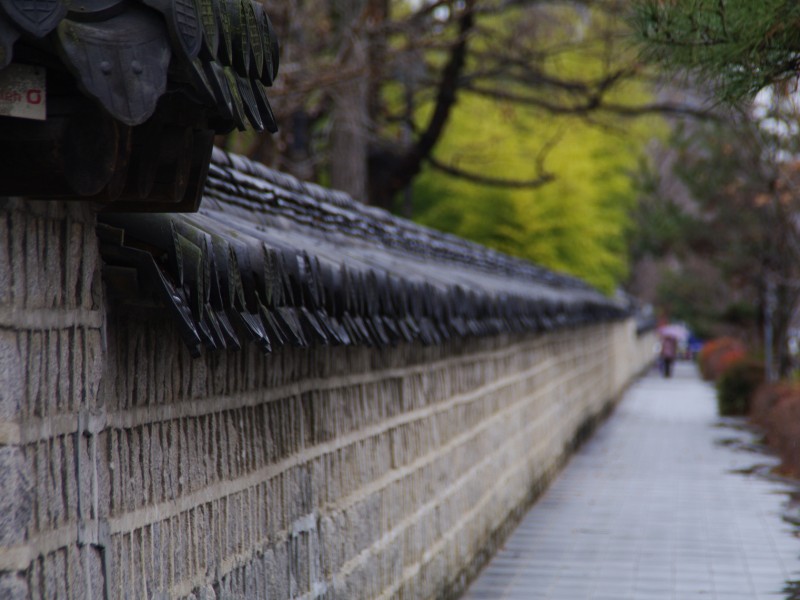
Ode To Jeonju
There once was a city named Jeonju Where the food was the star of the show Bibimbap was the dish of the day And makgeolli was there to stay
The streets were lined with hanok houses And the night market buzzed with spouses There were palaces and museums to explore And even a village of paper dolls galore
So come to Jeonju, don’t be shy Eat, drink, and explore, don’t be sly The city has so much to offer You won’t regret being a Jeonju lover!
